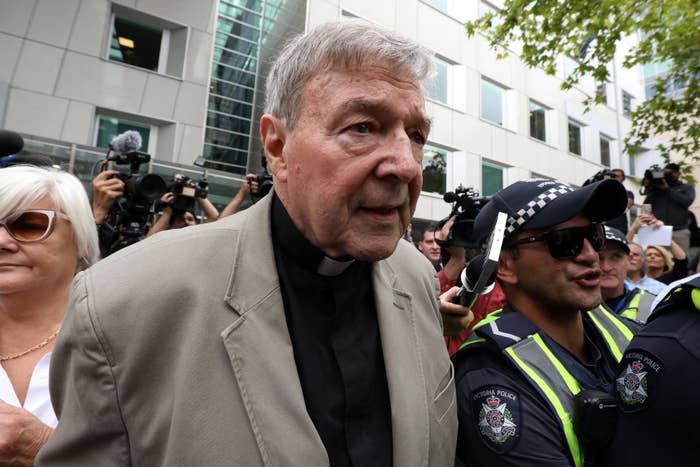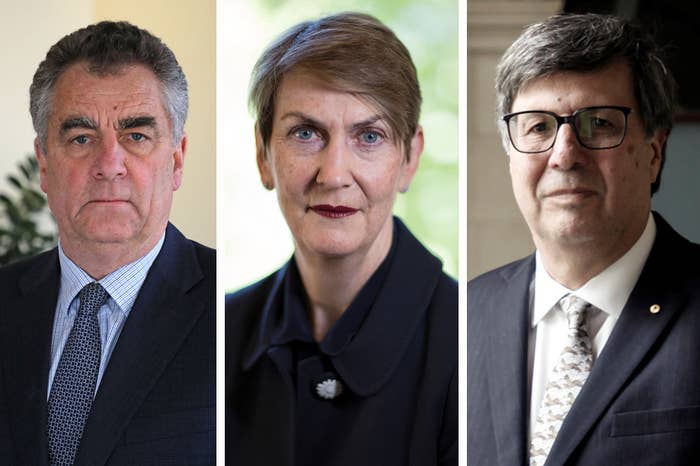
Cardinal George Pell's conviction for child sexual abuse will stand after an appeal court upheld the guilty verdict handed down by a jury last year.
The decision means Pell will remain in prison to see out the rest of his three-year, eight-month nonparole period.
The decision was handed down in Melbourne on Wednesday morning by three judges of the Victorian Court of Appeal: chief justice Anne Ferguson, president of the Court of Appeal and justice Chris Maxwell, and justice Mark Weinberg.
The decision was a 2–1 majority on the main ground of an unreasonable verdict, with Ferguson and Maxwell ruling the appeal should be dismissed and Weinberg dissenting.
All three judges rejected the other two grounds of appeal, which related to how the trial was conducted.
Pell, 78, was Australia's most senior Catholic and an inner circle adviser to Pope Francis before being charged with four counts of indecent assault and one count of sexual penetration with a child.
The Crown case at trial rested on the testimony of one man, now in his thirties, who testified that Pell had sexually abused him and a friend in 1996 and 1997 when they were 13-year-old choirboys at St Patrick’s Cathedral in Melbourne.
The other victim died in 2014 and, as far as the evidence suggested, never disclosed the abuse to anybody. Pell was the archbishop of Melbourne at the time.
Pell's surviving victim, who legally cannot be identified, said in a statement that the process had been stressful and he had experienced dark moments along the way.
"I just hope it is all over now," he said. "I need to be able to define myself away from all of this. Recently, I have started a new chapter in my life as a father. The experiences I have been through have helped me understand what is truly important.
"I am grateful for a legal system that everyone can believe in. Where everybody is equal before the law and no one is above the law."
The Vatican said a statement it "acknowledges" the court decision.
"As the proceedings continue to develop, the Holy See recalls that the Cardinal has always maintained his innocence throughout the judicial process and that it is his right to appeal to the High Court," the statement said.
"At this time, together with the Church in Australia, the Holy See confirms its closeness to the victims of sexual abuse and its commitment to pursue, through the competent ecclesiastical authorities, those members of the clergy who commit such abuse."

At the appeal hearing in June, Pell's barrister Bret Walker SC told the judges the jury must have entertained reasonable doubt as to whether the cardinal was guilty.
Crown barrister Chris Boyce QC described Pell's alleged victim as "a very compelling witness" whom the jury had good reason to believe.
Ferguson said that she and Maxwell had decided there was "nothing" in the evidence that suggested the jury who convicted Pell must have doubted his guilt.
"Justice Maxwell and I accepted the prosecution's submission that the complainant was a compelling witness, was clearly not a liar, was not a fantasist and was a witness of truth," she said.
Pell's legal team had argued there were 13 "solid obstacles" in the path of his conviction, including matters of timing and whether the sex abuse was physically impossible due to the heavy robes Pell was wearing at the time.
"The robes were not so heavy, nor so immoveable as the evidence of [witnesses] Monseigneur Portelli and Mr Potter had suggested," Ferguson said.
Ferguson and Maxwell inspected the robes themselves.
"We found that the robes were capable of being manoeuvred in a way that might be described as being pulled to one side or pulled apart," she said.
Justice Weinberg, who would have acquitted Pell, found that there was a "significant possibility" Pell may not have committed the offences.
"In justice Weinberg's view, there was significant and in some places impressive evidence suggesting that the complainant's account was, in a realistic sense, impossible to accept," Ferguson said.
In coming to their decisions, the three judges tried to put themselves in the "closest possible position to that of the jury".
This included watching more than 30 hours of video recordings, including the trial evidence of 12 of the 24 witnesses and Pell's police interview prior to being charged. They also read the 2000 page transcript and visited the cathedral.
Pell has always maintained his innocence. His lawyers are reviewing the decision and considering an appeal to the High Court of Australia.
The guilty verdict, initially guarded by a nonpublication order that was defied by some international media outlets, sent shockwaves through Australia when it was publicly revealed earlier this year.
Two trials were held in 2018; the first was aborted when the jury could not reach a verdict.
A second jury, who watched video footage of the evidence Pell's alleged victim gave at the first trial, unanimously found the cardinal guilty as charged in December.
Prime minister Scott Morrison urged victims of child sexual abuse to reach out to their family, friends and support services.
"The courts have done their job, they've rendered their verdict," he said. "That's the system of justice in this country and that must be respected," he said.
"My sympathies are with the victims of child sexual abuse not just on this day but on every single day ... events like this today bring it all back."
